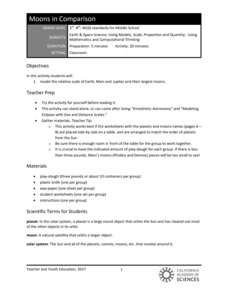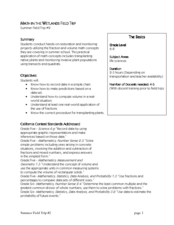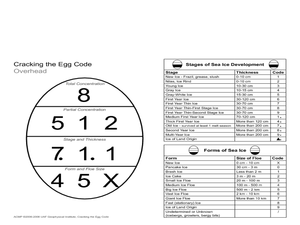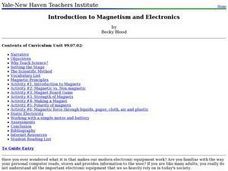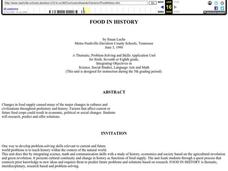Baylor College
Food: The Math Link
Enrich your study of food science with with these math worksheets. They offer a variety of food-related word problems that are great practice for multiplying, identifying fractions, estimating length, and performing calculations...
California Academy of Science
Moons in Comparison
Just how big is Earth's moon? With a hands-on simulation, scholars use Play-Doh to model the sizes of the planets Earth, Mars, Jupiter, and their moons. They make predictions as a class, work together to make their models, and discuss...
Curated OER
Math in the Wetlands Field Trip
Get your class out in the environment for hands on math activities. In this wetlands lesson, learners transplant native plants, calculate how much soil is needed, and perform math activities based on this experience. They then make...
Curated OER
Our Solar System - Comparing Planetary Travel Distances
NASA presents a mini-unit on distances in our solar system. It incorporates scientific concepts of gravity, mass, density, and payload while your aspiring astronauts also employ mathematics skills. They calculate speed, they determine...
Curated OER
Sea Ice: Cracking the Egg Code
Pupils study the egg code to learn about sea ice. In this sea ice instructional activity, students discuss and view a diagram to learn about the egg code when describing sea ice and its thickness. Pupils work in groups to play a game...
Curated OER
Introduction to Magnetism and Electronics
Learners are introduced to the concepts of magnetism and electronics. As a class, they walk through the steps of the scientific method and define new vocabulary. In groups, they are given a bag of objects and they are to separate them...
Curated OER
Piece of the Sky: Introduction for Making S'COOL Observations
Young scholars observe and discuss cloud cover. They identify percent of cloud cover, calculate cloud cover by fraction and convert to a percent, and compare their models with the current real sky cloud cover.
Curated OER
Food in History
Learners research, predict and offer solutions regarding factors that affect current or future food crops could result in economic, political or social changes.

